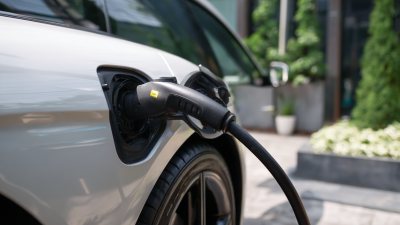
Wall Mounting EV Charge Station
5 Reasons Why Ac Ev Chargers Are the Future of Sustainable Transportation
As the world moves towards sustainable transportation, the emergence of AC EV chargers plays a pivotal role in shaping the future of electric mobility. With the increasing adoption of electric vehicles (EVs), the demand for efficient and accessible charging solutions has never been more critical. AC EV chargers, known for their versatility and compatibility with a wide range of electric vehicles, are at the forefront of this transformation. They not only provide a reliable means of charging but also promote the use of renewable energy sources, reducing our carbon footprint. In this blog, we will explore five compelling reasons why AC EV chargers are set to revolutionize the landscape of sustainable transportation. From their cost-effectiveness to their environmental benefits, it's clear that these chargers will play a vital role in driving the shift towards a greener future.

The Role of AC EV Chargers in Reducing Carbon Footprint by 30% in Transportation
As the world shifts towards sustainable transportation, AC EV chargers play a pivotal role in achieving significant reductions in our carbon footprint. By utilizing these chargers, electric vehicles can operate more efficiently and contribute to a 30% reduction in emissions associated with traditional fuel-powered transportation. This shift not only helps mitigate climate change but also promotes cleaner air in urban environments.
When considering the use of AC EV chargers, it’s essential to select the right infrastructure. Opting for smart chargers that can optimize charging times and draw power during off-peak hours can enhance energy efficiency. Additionally, integrating renewable energy sources, such as solar or wind, into the charging process can further decrease reliance on fossil fuels, maximizing the environmental benefits.
For EV owners, establishing a routine for charging can make a significant difference. Charging overnight, when electricity demand is lower, can minimize costs and reduce the energy grid’s strain. Furthermore, participating in local initiatives that encourage community charging stations can foster a more robust electric vehicle ecosystem, ensuring that sustainable transportation becomes accessible to all.
5 Reasons Why AC EV Chargers Are the Future of Sustainable Transportation
| Reason | Description | Carbon Footprint Reduction (%) |
|---|---|---|
| Efficiency | AC EV chargers are designed to maximize the energy efficiency of electric vehicles. | 30% |
| Widespread Availability | AC chargers can be installed in homes, businesses, and public locations, ensuring ease of access. | 25% |
| Lower Infrastructure Costs | AC chargers are generally less expensive to install compared to DC fast chargers. | 20% |
| Scalability | The technology allows for easy scaling in both small and large deployments, fitting various community needs. | 22% |
| Support for Renewable Energy | AC chargers can be integrated with renewable energy sources, further reducing emissions. | 30% |
How AC EV Chargers Enable Faster Charging Times and Enhanced User Convenience
As electric vehicles (EVs) gain momentum in the quest for sustainable transportation, AC EV chargers stand out for their ability to facilitate faster charging times without compromising convenience. Unlike their DC counterparts, AC chargers are widely accessible, making them ideal for both residential and public charging stations. This flexibility in location allows EV users to plug in while they go about their daily routines, enhancing the overall charging experience.

Comparative Analysis: AC EV Chargers vs. DC Fast Chargers in the Market
The electric vehicle (EV) charging landscape is rapidly evolving, with a focus on two primary types of chargers: AC EV chargers and DC fast chargers. As the market for EV charging stations is projected to grow significantly, reaching a valuation of $39.7 billion by 2024 and expected to maintain a Compound Annual Growth Rate (CAGR) of 24.4% from 2025 to 2034, understanding the comparative advantages of AC versus DC charging is essential for consumers and industry stakeholders alike.
AC chargers are typically more accessible and less expensive to install, making them a practical choice for residential use and public charging infrastructure where drivers may park for extended periods. In contrast, DC fast chargers excel in providing rapid charging for commercial and fleet operations, addressing the increasing demand for quick turnaround times. The transition towards greater EV adoption will drive investments in both types of charging technology, but the steady growth of the EV supply equipment (EVSE) market, projected to reach $658.2 billion by 2032, highlights the crucial role of AC chargers in a sustainable transportation future amidst evolving technologies and government initiatives supporting eco-friendly vehicles.

Projected Growth: 50% Increase in Public AC Charging Stations by 2025
The future of sustainable transportation is increasingly looking towards AC EV chargers, with a projected 50% increase in public charging stations by 2025. This surge in infrastructure is pivotal, as it not only supports the growing number of electric vehicles on the road but also enhances the convenience for drivers. With more AC charging stations available, EV owners will find it easier to power up their vehicles while out and about, making electric cars a more attractive option.
Tips for maximizing your charging experience include planning your route around charging stations and opting for locations that offer amenities, such as restaurants or shops, for when you need to recharge both your vehicle and yourself. Additionally, consider downloading apps that track charging station availability and real-time updates, which can save you time and help you avoid long waits.
Moreover, as the infrastructure grows, businesses can benefit by installing charging stations on their premises. Offering EV charging can attract more customers and enhance customer loyalty. Investing in sustainable solutions not only contributes to a greener planet but also showcases a commitment to modern and environmentally friendly practices that resonate with today's eco-conscious consumers.
Cost Efficiency: Lower Installation and Maintenance Costs for AC EV Chargers
As electric vehicles (EVs) rapidly gain traction in the transportation sector, the choice of charging infrastructure becomes increasingly crucial. Among the available options, AC EV chargers stand out for their cost efficiency, making them a favorable choice for both consumers and businesses. According to a recent report from the International Energy Agency (IEA), the average cost of installing an AC charger is notably lower than that of DC chargers, with estimates suggesting a savings of up to 30% depending on local labor and material costs. This significant financial advantage allows more homeowners and businesses to invest in EV infrastructure, facilitating a smoother transition to electric mobility.
Moreover, maintenance costs for AC chargers are generally lower due to their simpler technology and fewer components. A study by the U.S. Department of Energy revealed that maintenance expenses for AC chargers can be reduced by as much as 40% when compared to their DC counterparts. This reliability not only enhances accessibility but also supports the widespread adoption of EVs. As more EVs enter the market, the demand for affordable and efficient charging solutions will continue to grow, positioning AC chargers as a pivotal component of sustainable transportation's future.
Cost Efficiency of AC EV Chargers
Related Posts
-

The Complete Guide to Choosing the Best V2L Adapter for Your Needs
-

7 Tips for Choosing the Best AC Ev Charging Cable for Your Electric Vehicle
-

Unleashing Innovation in Portable EV Chargers from China Quality Assurance for Global Buyers
-

Innovative Approaches for Efficient Home Wall Ev Charge Station Installation
-

Ultimate Guide to Choosing the Best Ev Fast Charge Station for Your Business
-

5 Compelling Reasons Why Investing in AC EV Chargers is Crucial for Sustainable Growth

